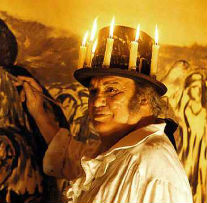
In Spain, devotion to auteur films,
inherited from the French "Nouvelle Vague" and badly understood in
general, has prevented the development of genuine, all-round
producers. In most cases the figure of the executive producer has
been favored, a person whose task is limited to obtaining and
managing the funds and who in the short and mid-term is merely a
simple intermediary between the author and the entities that supply
the film's finance. To persevere in this auteur policy is
catastrophic. An entire generation of producers are now suffering
the consequences of this tendency. During the 1960s and 1970s, the
new Spanish cinema idolized the authors (directors) of some
extraordinary films, as if they were myths (film directors like
Erice, Saura, Berlanga); genuine thinkers and analysts of the
social and human reality who created a body of work that today
represent a compulsory reference point for our authors. But the
reemergence of the director-author figure had an undesirable and
perverse effect: it encouraged many directors of dubious merit and
mediocre vision to consider themselves authors too, given the
benefits - especially in terms of egocentrism - obtained from
showing off their mediocre talent. The vision & reputation of
cinema as a wide-ranging means of communication was damaged and
discredited by this phenomenon. A serious crisis in film ensued and
lasted until the end of the 1980s, when viewers literally fled
Spanish movies. It took a new generation of directors and
producers, who reached their creative maturity at the beginning of
the 1990s, to establish the building blocks of a new esthetics and
creative revolution whereby films were understood as a means of
entertainment at the service of the public.
Thanks to them and other veteran
directors, albeit with a wider vision of the industry, little by
little the negative and pejorative label to the expression:
all-round production film is disappearing. An unfortunate and
inadequate label in all regards since with the exception of the
directors that produce their own films, every director is under
orders from a producer who entrusts him with making a film, even if
the director has come up with the idea and taken it to the
producer's office.
Despite what some fervent defenders
of the old director-author arrangement might say, this new trend in
no way implies a decrease in the artistic quality of the films.
Quite the contrary, if we analyze some of the most successful films
in terms of box office hits over the last ten years, we will see
that there is always a message in them. There is however a
difference with respect to the preceding period: Instead of trying
to get the public to swallow the message automatically, the message
is revealed in a more subtle way by introducing it in the wrapping
of a commercial film.
In summary, we can say that the
figure of the producer as a creator or maker of films is today more
necessary than ever. The producer has the global vision and
necessary perspective to guide the creative effort and talent of
the authors, a task that should always be approached from a
perspective of respect and dialogue.
A.V.G. [The audiovisual arts]